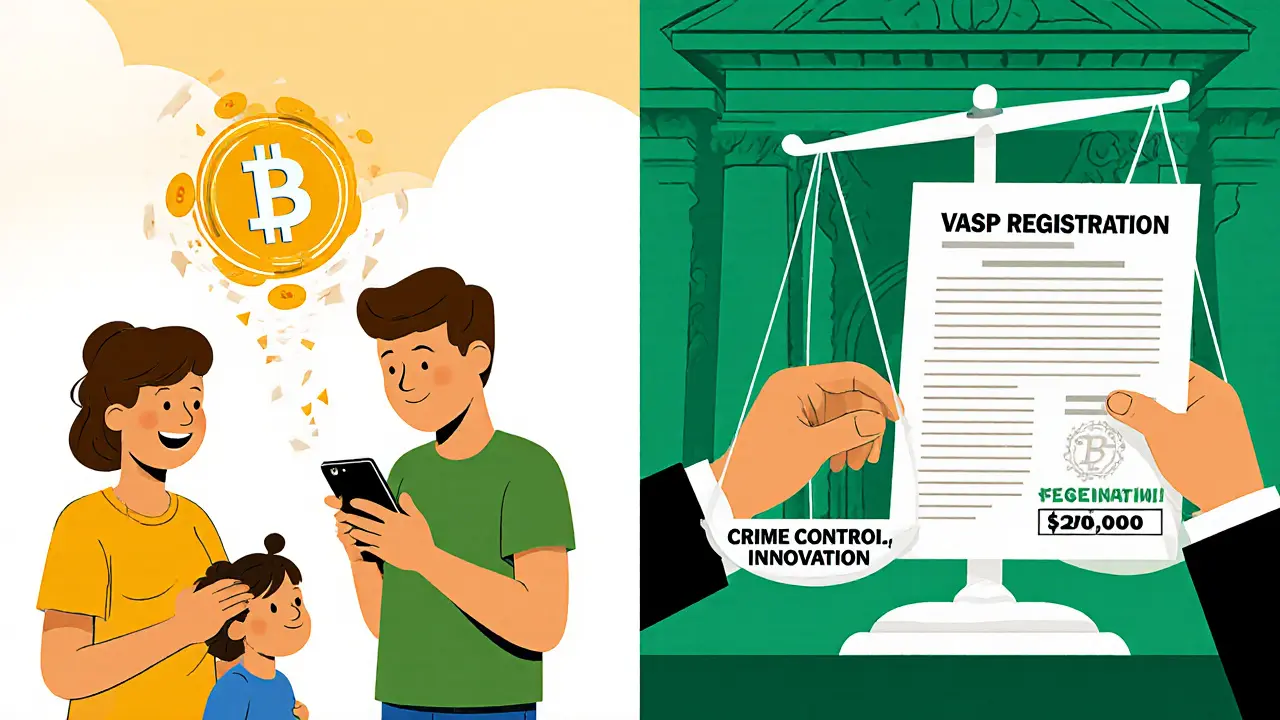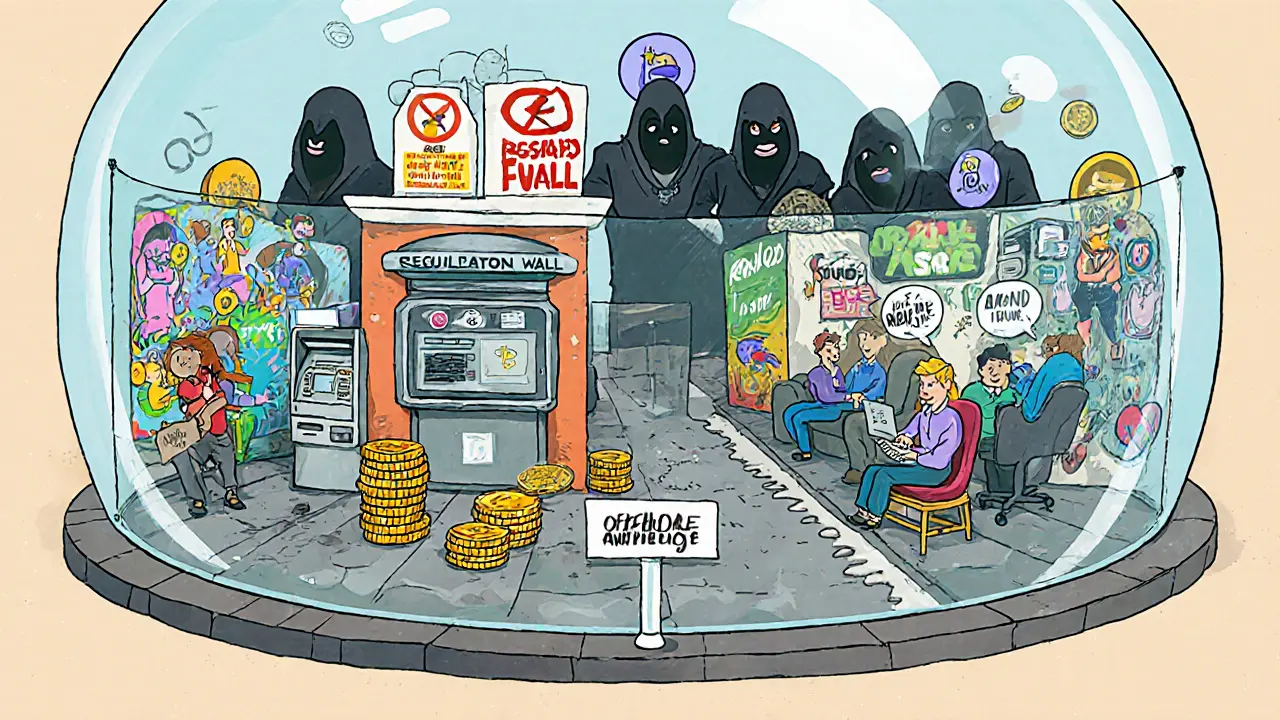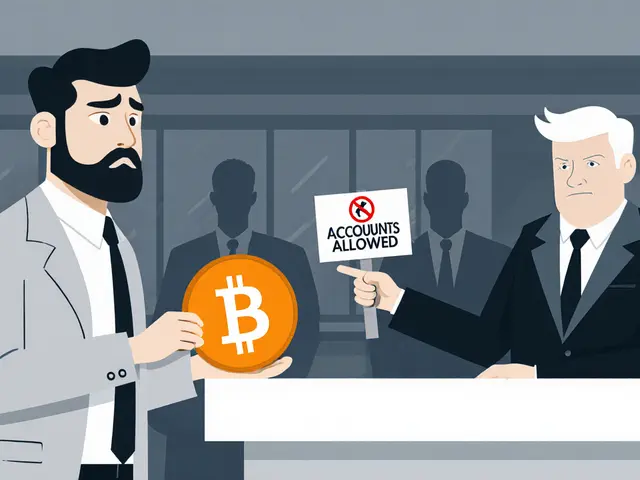Costa Rica Crypto Business Compliance Cost Estimator
Estimate Your Compliance Costs
Based on Costa Rica's VASP registration requirements and reported business costs.
Costa Rica Crypto Compliance Overview
Key Facts:
- VASPs must register with SUGEF (no approval required)
- Compliance costs range from $25,000 to $75,000
- Banks often refuse accounts to crypto businesses
- No capital gains tax for individuals
Estimated Compliance Costs
Note: These are estimated costs based on article data. Actual costs may vary. Most businesses report $25k-$75k in compliance costs for 2025.
Recommendations:
- Budget for $25,000 minimum for basic registration
- Consider offshore banking options if local banks refuse
- Factor in ongoing reporting costs ($5k-$10k annually)
Costa Rica doesn’t treat Bitcoin, Ethereum, or any other cryptocurrency as money. Not legally. Not officially. Not even close. That’s not a loophole - it’s a deliberate choice. While countries like El Salvador made Bitcoin legal tender, Costa Rica took a different path: no recognition, no endorsement, but also no ban. The result? A confusing, high-stakes gray zone where crypto businesses operate under the radar, banks turn them away, and regulators are slowly catching up.
What Does ‘No Official Recognition’ Actually Mean?
The Central Bank of Costa Rica made it clear in 2021: cryptocurrencies aren’t currency. They’re not foreign money. They’re not legal tender. That means you can’t pay your taxes with Bitcoin. You can’t settle a court judgment in Ethereum. Your landlord doesn’t have to accept Dogecoin for rent. If you try to use crypto like cash, you’re on your own.
But here’s the twist: that doesn’t mean crypto is illegal. People trade it. Businesses accept it. Exchanges operate. The government just won’t say it’s money. Instead, it calls it a virtual asset - a digital thing you can trade, transfer, or hold, but not spend like colones.
This distinction matters. It means crypto isn’t protected by financial laws meant for banks or credit cards. If you lose funds in a scam, there’s no government insurance. If an exchange crashes, you have no legal recourse under currency regulations. You’re dealing with a digital commodity, not a payment system.
The New Law That’s Coming (And Why It’s Not What You Think)
In July 2025, Costa Rica’s Legislative Assembly passed the first debate of Proyecto de Ley Expediente 22.837. This isn’t a bill to legalize crypto. It’s a bill to control it.
The law defines Virtual Asset Service Providers (VASPs) - anyone who exchanges crypto for colones, holds crypto for clients, or runs a crypto exchange. These businesses must register with SUGEF, the country’s financial supervisory agency. But here’s the catch: registration doesn’t mean approval. It doesn’t mean permission. It’s just a formality to track who’s operating.
Why? To fight crime. The law’s real goal is to stop money laundering, terrorist financing, and drug trafficking. That’s why VASPs must collect full KYC data, monitor every transaction, and report anything suspicious. It’s not about helping crypto grow - it’s about keeping it contained.
Compare that to Panama, which created a regulatory sandbox to attract crypto startups. Or El Salvador, which made Bitcoin legal tender. Costa Rica isn’t trying to be a hub. It’s trying to be a wall.
The Banking Problem: Why No Bank Wants Your Crypto Business
If you want to start a crypto business in Costa Rica, the first hurdle isn’t the law - it’s the bank.
Most traditional banks here refuse to open accounts for crypto companies. Not because it’s illegal. Because they’re scared. They fear fines from international regulators. They worry about being labeled as enablers of crime. So they say no - even if you’re fully compliant with SUGEF’s rules.
Entrepreneurs report spending 6 to 8 months trying to open a business account. One founder on Reddit said he got rejected by three major banks before finding a small credit union willing to work with him - under strict monthly audits and transaction limits.
That’s the hidden cost of no recognition. You can register your company in 15 days. But without a bank account, you can’t pay employees, buy software, or even accept payments from customers. Many businesses end up using offshore banks, which adds complexity, fees, and risk.

Who’s Still Operating Here - And Why?
Despite the banking headaches, crypto businesses are still showing up. Why?
- Low taxes. Costa Rica doesn’t tax crypto gains for individuals. Foreign investors pay no capital gains tax on crypto sales.
- Political stability. Unlike neighbors like Nicaragua or Venezuela, Costa Rica has a functioning democracy and no hyperinflation.
- Digital infrastructure. High-speed internet, reliable power, and a skilled tech workforce make it easy to run remote operations.
According to the Blockchain Association of Costa Rica, 78% of crypto companies surveyed would recommend the country as a base - even with the banking issues. There are now 287 registered crypto-related entities, handling an estimated $1.2 billion in activity as of mid-2025.
Most of these are small to mid-sized firms: crypto ATMs, local exchanges, blockchain consulting shops, and NFT marketplaces. Big institutional players? Not yet. Without legal recognition, banks won’t touch them. Hedge funds and venture capital stay away.
What This Means for Everyday Users
For regular people, crypto in Costa Rica is a personal gamble.
14.3% of adults have owned crypto at some point - below the Latin American average of 22.7%, but higher than Nicaragua’s 8.9%. Many use it for remittances, especially from the U.S., because it’s faster and cheaper than Western Union. Others buy Bitcoin as a hedge against inflation.
But there’s no safety net. If you use a local exchange that gets shut down? No refund. If you lose your private keys? No customer service. If you get hacked? No recourse.
And while some shops in San José accept Bitcoin, it’s rare. Most businesses convert it to colones immediately. They don’t want to hold it. They don’t want the risk. They’re just using it as a payment tool - not as money.

The Road Ahead: Will Costa Rica Change Its Mind?
There are two bills moving through Congress right now: Bill 22.837 (focused on AML) and Bill 23.415 (the ‘Cryptoassets Market Law’). The first is expected to pass by October 2025. The second is still in committee.
Don’t expect the government to declare Bitcoin legal tender. That’s not happening. But they might create clearer rules for exchanges, wallets, and token sales. They might even set up a licensing system for VASPs - though again, that won’t make crypto money.
The goal isn’t adoption. It’s control. Costa Rica wants to be seen as compliant with global standards - FATF, OECD, and the Crypto-Asset Reporting Framework. They’re not trying to lead. They’re trying to avoid being punished.
By 2026, SUGEF plans to upgrade its monitoring system with a $2.3 million budget. They’ll track more transactions, flag more risks, and demand more paperwork. That’s the future: more bureaucracy, not more freedom.
Is Costa Rica a Good Place for Crypto Right Now?
It depends on what you’re looking for.
If you’re a small business or freelancer: You can operate. The setup is fast. Taxes are low. But you’ll need patience for banking. Plan for $25,000-$75,000 in compliance costs. Hire a full-time AML officer. Expect delays.
If you’re an investor or trader: You can buy and hold. But don’t expect legal protection. Use cold wallets. Don’t trust local exchanges. Be ready to move funds offshore if things get messy.
If you’re a startup seeking funding: Skip it. Investors won’t touch you without legal recognition. No bank, no VC, no institutional backing. You’re on your own.
Costa Rica isn’t a crypto paradise. It’s not a crypto prison either. It’s a quiet, cautious experiment - one where innovation survives in the cracks, but never gets official backing.
The country’s strategy is simple: let crypto exist, but don’t let it grow. Keep it small. Keep it tracked. Keep it contained. And hope that if things go wrong, they go wrong somewhere else.
Is it legal to use Bitcoin in Costa Rica?
Yes, it’s legal to own, trade, and use Bitcoin in Costa Rica. But it’s not legal tender. You can’t use it to pay taxes, fines, or official fees. Businesses can accept it, but they’re not required to. There’s no law banning it - but there’s also no law protecting you if something goes wrong.
Can I open a bank account for my crypto business in Costa Rica?
It’s extremely difficult. Most major banks refuse to work with crypto businesses due to fear of regulatory penalties. Some smaller institutions may accept you, but only under strict monitoring, regular audits, and high compliance costs. Many entrepreneurs end up using offshore banking, which adds complexity and risk.
Does Costa Rica tax cryptocurrency gains?
No, Costa Rica does not currently tax capital gains from cryptocurrency for individuals. Foreign investors also pay no capital gains tax on crypto sales. However, if you run a crypto business and earn income from it, that income may be subject to corporate taxes. Always consult a local tax advisor.
What’s the difference between Costa Rica and El Salvador’s crypto policies?
El Salvador made Bitcoin legal tender in 2021 - meaning it must be accepted as payment for goods and services, and can be used to pay taxes. Costa Rica explicitly rejects that. It doesn’t recognize crypto as money at all. El Salvador is trying to integrate crypto into its economy. Costa Rica is trying to contain it.
Will Costa Rica ever recognize crypto as legal tender?
Almost certainly not. The government’s focus is on anti-money laundering and financial control, not adoption. The current legislation is designed to regulate crypto as a risk, not a revolution. There’s no political momentum or public demand to make it legal tender. The country’s approach is about stability - not innovation.
How many people in Costa Rica use crypto?
About 14.3% of Costa Rican adults have owned cryptocurrency at some point, according to Chainalysis’ 2025 Global Crypto Adoption Index. That’s below the Latin American average of 22.7%, but higher than neighboring Nicaragua. Usage is mostly for remittances and speculative investment, not daily spending.

Michael Brooks
Costa Rica’s approach is actually the smartest one in Latin America. No legal tender, no hype, just quiet regulation. They’re not trying to be El Salvador or Panama-they’re trying to avoid becoming a money laundering hotspot. And honestly? That’s responsible.
Ruby Gilmartin
Let’s be real-this ‘gray zone’ is just chaos with better coffee. If your business can’t open a bank account, you’re not operating-you’re gambling. And the fact that 78% of companies still recommend it? That’s not a win, that’s desperation dressed up as resilience.
Douglas Tofoli
low taxes + no crypto tax = i’m moving there fr. 😎💸
who needs banks anyway? just use crypto atm’s and wire it offshore. easy peasy. also, anyone know a good aml consultant in san jose? 🙏
Elizabeth Stavitzke
Oh wow, so Costa Rica is ‘cautious’? That’s just code for ‘we’re too scared to innovate.’ Meanwhile, the U.S. is building actual crypto infrastructure and they’re over there treating Bitcoin like a suspicious package at the airport. Pathetic.
FRANCIS JOHNSON
There’s a quiet wisdom here that the world refuses to see. Costa Rica isn’t rejecting crypto-it’s refusing to let it corrupt its soul. They’ve chosen stability over spectacle, safety over spectacle, dignity over dopamine. In a world that’s screaming ‘adopt or die,’ they whisper: ‘live, and let live.’
That’s not backward. That’s brave.
Imagine a country that says: ‘We won’t be your laboratory. We won’t be your sandbox. We’ll be your sanctuary.’
Maybe the future of crypto isn’t in legal tender-it’s in quiet spaces where people can hold value without the noise. Maybe Costa Rica isn’t behind the curve…
maybe it’s the only one still on the right one.
Ainsley Ross
As someone who’s lived in both Costa Rica and the U.S., I can say this: the cultural attitude here toward money is fundamentally different. There’s less obsession with ‘getting rich quick’ and more emphasis on sustainable living. Crypto isn’t banned-it’s just not romanticized. That’s not a flaw. It’s a cultural strength.
And yes, banking is a nightmare-but that’s true for *any* regulated industry here. It’s not anti-crypto. It’s anti-risk. And honestly? That’s a value worth preserving.
Brian Gillespie
My cousin runs a crypto ATM in San Jose. Bank rejected him 5 times. Now he uses a credit union that audits him every week. He’s fine. Just slow.
Michael Faggard
VASPs under SUGEF = regulatory capture disguised as compliance. The real issue isn’t crime-it’s institutional inertia. The Central Bank doesn’t want to lose control of monetary sovereignty. So they create a regulatory thicket to stifle adoption while pretending they’re protecting the public. Classic central bank behavior.
And don’t get me started on the $2.3M monitoring upgrade. That’s not security-it’s surveillance theater. They’re building a digital panopticon for traders. And for what? To track people who aren’t even breaking the law?
William Moylan
They’re lying. This whole ‘no ban’ thing is a lie. The government is working with the IMF and the Fed to quietly phase out crypto. They’ve already flagged 80% of local exchanges for ‘suspicious activity.’ You think those bank rejections are just fear? Nah. They’ve been ordered to cut them off. And the ‘low taxes’? That’s about to change. They’re setting up a hidden crypto tax under ‘digital services levy.’ Just wait. 2026 will be the year they come for your wallet.
David Billesbach
Costa Rica is a CIA front. They’re not ‘cautious’-they’re a puppet. The U.S. Treasury is behind this entire ‘no recognition’ policy. Why? Because if crypto thrives here, it exposes how the dollar is a fragile house of cards. They’re suppressing it because they can’t control it. And the fact that you’re all falling for their ‘stable democracy’ propaganda? That’s the real scam.
They’re not protecting citizens-they’re protecting Wall Street. Wake up.
Wayne Dave Arceo
Anyone who thinks Costa Rica’s approach is ‘smart’ is delusional. You can’t have a modern economy without recognizing digital assets as legal tender. This is like banning email because you’re scared of spam. The U.S. and EU are moving toward CBDCs and tokenized assets-Costa Rica is stuck in 2012. They’re not preserving culture. They’re preserving irrelevance.